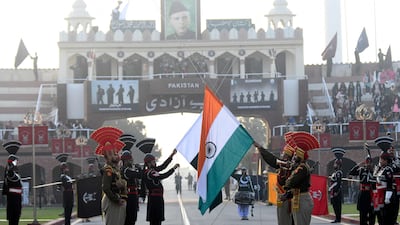Pakistan and India celebrate their independence day on August 14 and 15, respectively.
The countries emerged from the partition of British India in 1947 and have since been geopolitical rivals, fighting several wars and stockpiling nuclear weapons.
They also compete fiercely in the unofficial national sport of cricket, which attracts large audiences in both countries.
Home to a combined total of more than 1.6 billion people, or about a fifth of the global population, the two countries are among the most populous in the world.
India is significantly larger and has an economy to match, but both nations are important globally.
Here are seven charts that compare India and Pakistan in 2023.
Population
Both countries are among the top 10 most populous in the world. They continue to grow.
India this year overtook China to become the world’s most populous country, the UN said.
Its population of 1.4 billion is spread across states that are larger than many countries. About 200 million people live in the northern state of Uttar Pradesh.
Pakistan is much smaller, but is still the world's fifth most populous country, with more than 230 million people.
It is also one of the world's fastest growing countries and is expected to reach a population of about 487 million by 2100.
Both countries face demographic challenges and opportunities due to their growing populations.
More than half of India's population is below the age of 30, with 27.6 the median age.
Pakistan has an even younger population, with an average age of 20.2, and 65 per cent are under 30.
Both have more men than women, with 106.7 men for every 100 women in India and 101.9 men for every 100 women in Pakistan.
Economy
India's economy is far larger than that of its neighbour.
India is the world's fifth largest economy and is expected to record further growth this year.
Meanwhile, Pakistan is facing economic problems. It has the fastest inflation rate in Asia – it was 28.3 per cent in July – in contrast to India's rate of 4.8 per cent for the same month.
This year, Pakistan was forced to secure a $3 billion bailout package from the International Monetary Fund, after the country came close to defaulting on its debts.
Pakistan has taken more than 20 loans from the IMF since 1958 and relies on external help more heavily than India.
This foreign aid helped Pakistan's economy to grow faster than India's from the 1960s through the 1980s, but India has outpaced its neighbour in growth since liberalising its economy in 1991.
The difference in their economies is illustrated by their diverging gross domestic product per capita, which shows a country's GDP – the total monetary value of all the services and goods produced within a country – divided by its population.
Last year, India's was $2,380, compared with Pakistan's $1,660.
Despite India's progress in growth, both countries face economic challenges, with high rates of poverty and stark inequality.
About 230 million people remain in multidimensional poverty in India, according to data from 2019 and 2021, despite 645 million escaping poverty from 2005 to 2006, a UN Development Programme report said.
It said Pakistan had 84 million people in poverty between 2017 and 2018, down from 91 million in 2012 to 2013.
Military
India and Pakistan have fought four major wars since gaining independence from Britain, predominantly centred on the disputed Kashmir region.
The countries fought for control of Jammu and Kashmir between 1947 and 1948. The conflict was inconclusive and left India in control of about two thirds of the territory.
A further war in 1965 changed little.
The Indo-Pakistani War of 1971 took place as part of the Bangladesh Liberation War, in which India supported Bengali nationalists in their move to gain independence from Pakistan.
Pakistan suffered a defeat and what was formerly known as East Pakistan became the independent nation of Bangladesh.
Although skirmishes and limited conflicts continue to break out periodically between India and Pakistan, the last major conflict was the Kargil War in 1999. It was once more fought over Kashmir, with minimal changes in the territory following the fighting.
Both countries are nuclear powers and it is believed their nuclear arsenals are of similar size.
Neither has signed the Nuclear Non-Proliferation Treaty, a global pact to stop the spread of nuclear weapons.
India has pledged that it would not be the first to use nuclear weapons in a conflict with its neighbour. Pakistani officials have previously said the country would use "any weapon in our arsenal" if it was invaded.
Sport
Sporting contests between India and Pakistan have been described as "war minus shooting".
No sport comes close to cricket for its popular appeal in the countries, and no fixture is bigger in the sport's calendar than India versus Pakistan, which attracts a massive audience.
“India playing Pakistan involves the sentiments of millions. You become a hero if you perform well … you are portrayed as a villain if your team loses,” former Pakistan captain Wasim Akram was quoted by Dawn as saying.
Every victory on the cricket field counts.
Pakistan have the edge over India in head-to-head matches. Their national team have won 88 matches, compared with India's 72.
However, India have won the Cricket World Cup twice (1983 and 2011), while Pakistan have won it once (1992).
Both have won the T20 World Cup once. India have won the ICC Champions Trophy twice, while Pakistan won once.
In women’s cricket, India have won all 11 ODIs against Pakistan. India's team have won 11 T20 matches compared with Pakistan's three.
Outside cricket, Pakistan have a strong record in men's hockey, having won the World Cup and four Olympic gold medals. India have triumphed in one World Cup and have earned five Olympic golds since independence.
India have won 30 Olympic medals, while Pakistan have won 10.


